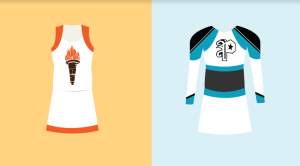Dear Delaney: Love, Nerves, Concern
Delaney Jackson, Content Editor of Print
April 3, 2018

I’m in a pretty serious relationship and he just told me he loved me but I’m not quite sure if I’m ready to say it back. It isn’t that I don’t feel a lot for him, I’m just afraid that it will end badly.
-Hesitant
Love is not a quick, fleeting feeling - it’s a serious commitment and a choice you have to make every day. When you choose to love, you choose to sacrifice what you want for the other person’s happiness. It means that you have to put their needs above your own even when it is inconvenient or when ‘they don’t deserve it.’
If you say that you love someone without complete certainty, you will regret it later. So the fact that you’re questioning this shows me that you probably aren’t ready to make a commitment like that. It is TOTALLY okay to need time to make that decision, and it actually shows that you care about their feelings enough to put what feels natural aside. Enjoy your relationship where it is.
I have horrible social anxiety but I've had a very ridiculous crush on this girl for a while now, despite probably not being her type I feel as if I should tell her but I really cannot fathom how without freaking out. Any helpful thoughts or opinion that could be of any use?
-Quiet and queasy
Step one here is to establish a good friendship with her. It will be a lot easier to explain your feelings when you are completely comfortable around her, which comes with friendship. So instead of just jumping in and professing your feelings, show your feelings to her by being there for her, listening to her and hanging out with her in a casual setting. Not only will that make you more comfortable, but it will make her more comfortable as well.
And who knows? Maybe the feelings that come out of that time spent as friends will turn into something romantic. But if not, you’ve gained a close friend and you can’t complain about that.
My best friend has been dating a guy for like six months and I can see that their relationship is really unhealthy. He gets really mad at her when she hangs out with me or her other friends and he will randomly show up where we are. She insists that she’s happy though. What do I do?
-Concerned
Talking to your friends about the negatives in their relationship can be really difficult and I’ve seen it end in the loss of a friendship from time to time, so you have to be really careful in how you address it. That said, your friend is in an abusive relationship and that is much different than a friend who is just dating somebody you don’t like so as a close friend, it is important to open up the conversation.
When you do bring it up, don’t make it seem like an intervention - that can seem judgemental and can actually stop your friend from opening up. Instead, allow her to share what she is comfortable with about her relationship while you remind her that you care about her and see how complicated her situation is. Even though your friend may tell you she’s happy, if you are able to have a full conversation where she feels comfortable sharing, you may reach a place where she is honest with you about her true feelings. Be kind, be supportive, and most of all, just be there - don’t give up and don’t ignore it.
From the National Domestic Violence Hotline
Signs of an abusive relationship:
- Tells you that you can never do anything right
- Shows extreme jealousy of your friends and time spent away
- Keeps you or discourages you from seeing friends or family members
- Insults, demeans or shames you with put-downs
- Controls every penny spent in the household
- Takes your money or refuses to give you money for necessary expenses
- Looks at you or acts in ways that scare you
- Controls who you see, where you go, or what you do
- Prevents you from making your own decisions
- Tells you that you are a bad parent or threatens to harm or take away your children
- Prevents you from working or attending school
- Destroys your property or threatens to hurt or kill your pets
- Intimidates you with guns, knives or other weapons
- Pressures you to have sex when you don’t want to or do things sexually you’re not comfortable with
- Pressures you to use drugs or alcohol
If you or a loved one are experiencing one or more of these signs, contact a school counselor, trusted adult, or domestic violence shelter locally.
Other Resources:
Indiana Coalition Against Domestic Violence
1915 W. 18th Street, Suite B
Indianapolis, IN 46202
Hotline: 1 (800) 332-7385
Office: (317) 917-3685 Fax: (317) 917-3695
Website: www.icadvinc.org
Local: Turning Point Domestic Violence Services
turningpointdv.org
Or call the National Domestic Violence Hotline at 1-800-799-7233
Questions? Submit them here (they are completely anonymous):






